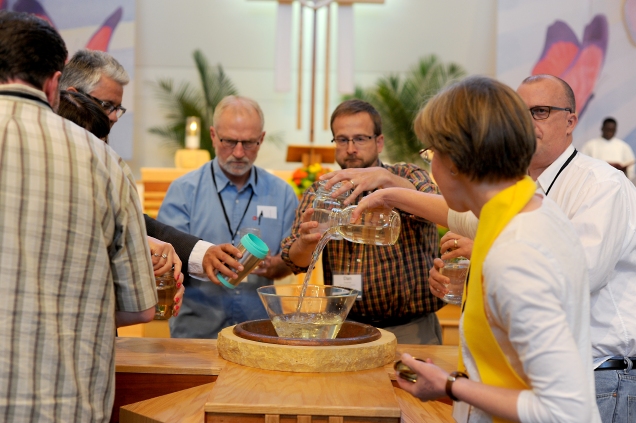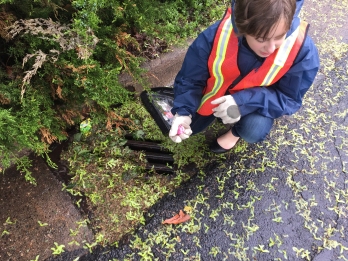
“I… I had no idea what the Doctrine of Discovery was. It’s unbelievable, really, it meant that land could be taken if there were no baptized Christians there.” I was jolted out of a moment of distractedly gazing at the stained glass windows during announcements. It was a Sunday morning in early September, and I was visiting a deep suburban congregation of the Evangelical Lutheran Church in America (ELCA) that I didn’t know well, but had worked with to coordinate an eco-stewardship project.
There he was, on a blue carpeted footstool at the pulpit microphone, leaning in with a pause: an entirely typical member of the congregation—certainly not the “peace-with-justice-committee” type—unable to hold back the passion welling up about an issue that was entirely new to him. In jolting sentences, clearly still processing, he shared what he was learning with the congregation in what would otherwise be a rather dry report about the Churchwide Assembly. The crack in his voice mid-phrase betrayed the vulnerability he felt at uncovering anguish in a history he claimed as his own. He was expecting just to show up as a delegate for a large-scale church meeting. Little did he know a resolution passed there on Repudiating the Doctrine of Discovery would cause a radical shift. Our social statements as church bodies matter. They can be transformational in unnoticed corners where we wouldn’t even anticipate.
I felt much hope listening to this lay member’s reflections, because I saw colonial history as being deeply related to our environmental crisis.
Having spent time at Standing Rock last fall, I was very aware of how pipeline routes in the Midwest exemplify the ways environmental degradation harms those who are already poor and marginalized, the undying chorus to Pope Francis’s plea for greater care for this earth. Oppression of people and exploitation of the land are integrally related, parallel parts of the structural sin we carry in our world today.
As people and institutions of faith, we have often been on the wrong side of history. As a religion that came from the margins, we’ve historically been awfully comfortable in siding with Empire for the sake of safety and economic benefit. It takes slow and careful work to untie these knots, to seek reconciliation with our sisters, brothers, and the land; and ultimately to mend ourselves and our faith. I believe that social statements on the part of faith leaders and church bodies are critical in recognizing these histories—in naming these knots—and empowering people of the church to get to work unbinding their hold on us.

I have found Laudato Si’ to be one of the most profound examples of a social statement doing just that: addressing the harm and empowering action. Its reverberations have been far-reaching. When I first spent time with the document, I was moved by such a deep and faithful challenge to business as usual of overconsumption and extraction. I found grounding in Pope Francis’s abiding gratitude that stands counter to commodification and in his unabashed stand with the marginalized whose resources others are decimating. Even more, the authoritative weight of Pope Francis’s words has strengthened faith communities and church leaders well beyond the Catholic Church and invigorated me.
As an environmental justice organizer for a Lutheran bishop (ELCA), I can’t even tell you the number of times after the encyclical’s release in 2015 that I found congregation members or pastors in Lutheran churches excitedly asking me “Have you read the pope’s encyclical yet?” Countless more times I, or Bishop Ann Svennungsen, started a statement to elected officials or community leaders with, “Given Laudato Si’, we’re clearly at a kairos in the religious community’s response to the environment….” The encyclical has marked a turning point for how people of faith, across traditions, have engaged environmental justice in the public sphere. We have stood up to match the tenor the pope set: that we are here, and we have work to do.
What has that work looked like? It has looked like the following:
- confirmation groups cleaning out and stenciling neighborhood storm drains, in efforts to keep trash out of our rivers and streams
- members from seven congregations showing up in a packed room downtown to get commitments from mayoral candidates on clean energy and equity
- running energy audits and incorporating green principles in renovations
- following in the footsteps of indigenous leader Sharon Day on a “Nibi Walk” (water walk), with each step as a prayer for the healing of the water
- adult forums and creative worship services that invite congregations to learn, pray, and sing their way into environmental practices
- writing letters to members of an energy utility board of a rural electric cooperative, advocating to expand clean energy options for members
- a meet-up at a local watershed district, learning the basics of water stewardship and heartily belting of “Shall We Gather at the River” through rain gardens to the bank of the Mississippi to read scripture and bless the water
This is resounding: the methods are many, but the essential feature is that we find opportunity in our own communities and contexts, always in relationship with our neighbors. It has profoundly impacted how we think about being “church together” in the synod of Lutheran congregations I serve. It falls in line with the sort of “EcoReformation” for which many are calling, as the Lutheran Church celebrates the 500th anniversary of the Reformation.
It’s at this 500-year moment that we also are seeing a coming together of Lutheran and Catholic judicatories. Last fall, I witnessed Bishop Ann Svennungsen, Archbishop Bernard Hebda, and Bishop Patricia Lull plan a joint worship service in recognition of this milestone anniversary. What’s striking to me is the way that we’re able to come together on social issues, even amid theological differences, to work the common good. In the current political realities, it fills me with hope to see people of faith work ecumenically on issues bound to the heart of our faith—care for the disenfranchised, the immigrant, and the earth. We have an opportunity at hand to imagine a different future together—a world that honors this earth from which “our very bodies are made up… [whose air] we breathe… [and from whose waters we] receive life and refreshment” (Laudato Si’, 2).